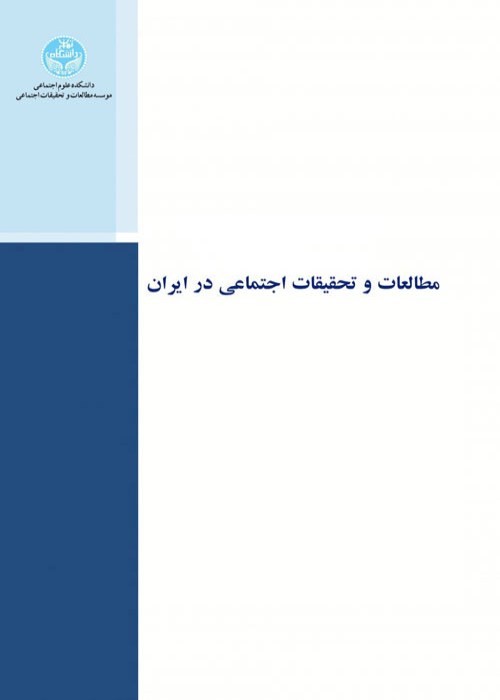Attitude to the Body: Generational Differences or Conflicts (Study of Generational Attitude toward Adolescent Embodiment in Tehran)
Author(s):
Article Type:
Research/Original Article (دارای رتبه معتبر)
Abstract:
Introduction
Body can be comprehended as the root of human identity, a time and a place in which the social world is embodied. Our understanding of our body and the meanings signified by this understanding vary depending on different social contexts. Moreover, adolescence is a period which body -as an unfinished and changing project- becomes an acute and critical sphere. The main aim in this article, first, is to analyse the understanding and attitude of adolescents in Tehran -as a generation- toward their body and others’ in their peer group. And second, to study the attitude adults -as previous generations- have toward this adolescents' understanding of body. In fact, the main effort is to learn how adolescents distinguish between bodies, and based on what regulations they classify bodies. And then to learn what attitudes adults have toward this understanding of body.Method
This study has been done through “Qualitative Research” and the data is grounded in “In-depth and Semi-Structured Interviews” with 17 adolescent boys and girls (aged 15 to 18) and 14 adult men and women (aged 21 to 48) in Tehran. The Maximum Variation sampling is used for finding the cases in various types and theoretical sampling is used to achieve conceptual saturation. Finally, the interview data were coded and categorized by “Thematic analysis”.Finding
Results show modern attitude toward body prevails among adolescents and most of them recognize body changeable and becoming. Although this understanding leads to puzzlement and sometimes worry for previous generations, the change itself and its ruling regulations paradoxically follow the totally traditional and gendered (masculine body and feminine body) patterns. Although this configuration seemingly represents adolescents’ embodiment ground breaking and altered, it has roots in values and patterns of previous generations. The same values and patterns but with different emersion and representation. It needs to be mentioned, the existing and continuity of these traditional regulations lies beneath the deep layers of this understanding and cannot be revealed effortlessly.Conclusion
Therefore, most of both adolescents and adults contradict the existence and continuity of these regulations. This contradiction is comprehensible. Part of the adolescents' fulfilment and identification is constructed from this contradiction they feel between themselves and previous generations. Approving this convergence of these apparently different regulations in understanding body, causes a crisis in their identification. Additionally, adults resist approving this convergence mostly because the outstanding difference they observe between the emergence and representation of this embodied understanding the adolescents and previous generations have; therefore, adults cannot recognize the fundamental and significant similarities. Occasionally, the idea of existing such contradiction gives identity to previous generations. Therefore, seemingly these two sides of this equation strive to accentuate the differences in order to consolidate the boundaries of “self” and “others” -as two or more different generations.Keywords:
Generation , Adolescent , body , embodiment , gender
Language:
Persian
Published:
Quarterly of Social Studies and Research in Iran, Volume:10 Issue: 2, 2021
Pages:
471 to 497
magiran.com/p2290088
دانلود و مطالعه متن این مقاله با یکی از روشهای زیر امکان پذیر است:
اشتراک شخصی
با عضویت و پرداخت آنلاین حق اشتراک یکساله به مبلغ 1,390,000ريال میتوانید 70 عنوان مطلب دانلود کنید!
اشتراک سازمانی
به کتابخانه دانشگاه یا محل کار خود پیشنهاد کنید تا اشتراک سازمانی این پایگاه را برای دسترسی نامحدود همه کاربران به متن مطالب تهیه نمایند!
توجه!
- حق عضویت دریافتی صرف حمایت از نشریات عضو و نگهداری، تکمیل و توسعه مگیران میشود.
- پرداخت حق اشتراک و دانلود مقالات اجازه بازنشر آن در سایر رسانههای چاپی و دیجیتال را به کاربر نمیدهد.
In order to view content subscription is required
Personal subscription
Subscribe magiran.com for 70 € euros via PayPal and download 70 articles during a year.
Organization subscription
Please contact us to subscribe your university or library for unlimited access!


